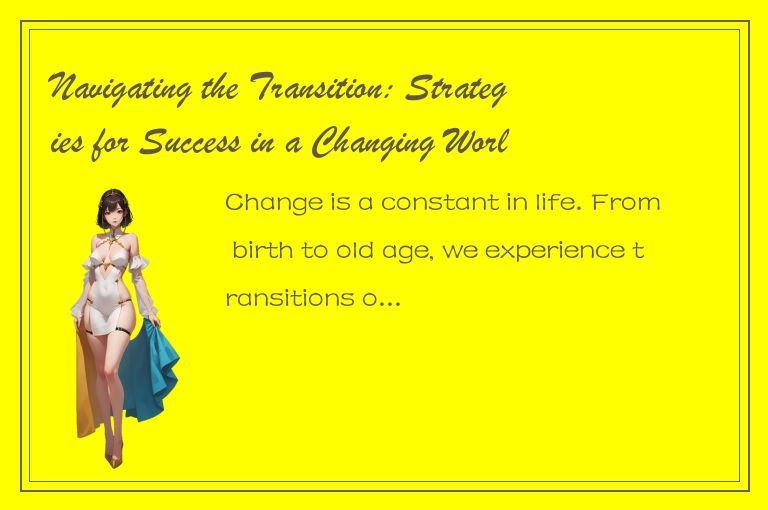Change is a constant in life. From birth to old age, we experience transitions of various kinds that take us from one stage to another. The world around us is also in a constant state of change, as we face economic, political, and social shifts that require us to navigate new terrain. As we adapt to these transitions, we must develop effective strategies to ensure success.

In recent years, we have seen a number of significant transitions in the global landscape. Technology has advanced to the point where it now shapes every aspect of our lives, from the way we communicate to the way we work. Climate change has become an urgent and pressing issue, with devastating consequences for our planet and its inhabitants. And the COVID-19 pandemic has upended our economies, our societies, and our sense of normalcy.
In the face of such upheaval, it is easy to feel overwhelmed and unsure. But by adopting the right strategies and mindset, we can successfully navigate these transitions and emerge stronger and more resilient. Below are some key strategies for success in a changing world.
1. Embrace Change
The first step in navigating any transition is to embrace change. Change can be difficult and uncomfortable, but it is also necessary for growth and progress. By acknowledging and accepting the inevitability of change, we can start to see opportunity where we once saw only uncertainty.
Instead of resisting change, we should actively seek out new opportunities and experiences. This could mean taking on new challenges, exploring unfamiliar environments, or learning new skills. By stepping outside of our comfort zones, we can expand our horizons and develop the flexibility and adaptability required to thrive in a changing world.
2. Build Resilience
Resilience is the ability to bounce back from adversity, to adapt to new circumstances, and to remain mentally and emotionally strong in the face of challenge. Building resilience is essential for navigating transitions, as it enables us to weather the storm of change and emerge stronger on the other side.
One way to build resilience is to cultivate a growth mindset. This means viewing setbacks and failures as opportunities for growth and learning, rather than as insurmountable obstacles. By adopting a growth mindset, we can harness the power of optimism, positivity, and self-belief to overcome obstacles and achieve our goals.
Another way to build resilience is to practice self-care. This means taking care of our physical, emotional, and mental health by getting enough sleep, exercising regularly, and engaging in activities that bring us joy and fulfillment. Self-care helps us maintain our energy, focus, and motivation, even in challenging times.
3. Develop Agility
Agility is the ability to move quickly and efficiently in response to changing circumstances. In a world where change is constant, agility is essential for success. As individuals and organizations, we must be able to pivot rapidly in response to new information or shifting priorities.
One way to develop agility is to prioritize continuous learning and improvement. By staying up-to-date with the latest trends and technologies, we can anticipate changes and respond quickly to new challenges. This could mean investing in professional development or seeking out mentorship and coaching to broaden our skillset and knowledge base.
Another way to develop agility is to embrace innovation and experimentation. This means being willing to try new things, take calculated risks, and learn from our mistakes. By adopting a mindset of innovation and experimentation, we can find creative solutions to complex problems and stay ahead of the curve in a rapidly changing world.
4. Foster Collaboration
Collaboration is the act of working together towards a common goal. In a changing world, collaboration is essential for success. By bringing together diverse perspectives, experiences, and expertise, we can tackle complex problems and achieve more than we ever could alone.
One way to foster collaboration is to build strong relationships and networks. This means connecting with others who share our values, interests, and goals, and working together towards a shared purpose. By building strong relationships, we can create a sense of community and belonging, and tap into the collective wisdom, resources, and support of others.
Another way to foster collaboration is to embrace diversity and inclusion. This means valuing and respecting the differences among us, and creating an environment where everyone feels welcome and valued. By fostering diversity and inclusion, we can create a more innovative, resilient, and successful world for all.
In conclusion, navigating the transition requires a combination of mindset, skills, and strategies. By embracing change, building resilience, developing agility, and fostering collaboration, we can successfully navigate the challenges of a rapidly changing world, and emerge stronger and more resilient on the other side.




 QQ客服专员
QQ客服专员 电话客服专员
电话客服专员